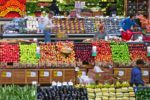Helpful Tips for Managing Household Waste

The following article was kindly written and contributed by Briana Jones. Waste management and waste reduction are pressing issues around the world. With the global population predicted to balloon to 9.7 billion by 2050, it’s imperative that we find ways to minimise waste and manage it properly. If we don’t, we’ll soon be living in a world with more waste than available resources. Thankfully, there are many ways that individuals and families can contribute to the worthwhile cause of managing and minimising waste. Here are some simple, helpful tips to help manage waste in your Australian home. Avoid Plastics Plastic …












